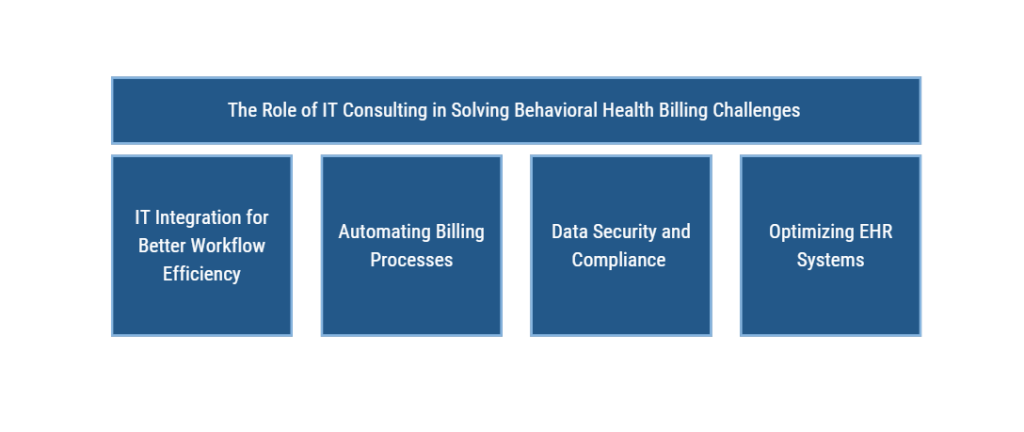
Behavioral Health Billing: Tips to Overcoming Challenges
October 2, 2024Behavioral health billing is often a more complicated and stressful task than in other areas of healthcare. Many behavioral health providers face unique challenges related to coding, reimbursement, and insurance claims that directly impact their revenue and operational efficiency.
Unlike other medical fields, behavioral health has distinct documentation and billing requirements, which can lead to higher rates of claim denials and financial losses if not managed effectively.
Common issues include frequent claim rejections due to improper coding, dealing with various insurance policies with differing rules, and navigating the complexities of mental health coding guidelines.
These problems make it harder for behavioral health practices to maximize reimbursements and maintain a steady cash flow. As a result, many providers find themselves struggling to allocate enough time to patient care while balancing the burden of billing issues.
The key to overcoming these challenges is understanding how to streamline the billing process and reduce errors. Effective strategies, such as adopting technology solutions, automating manual billing tasks, and improving coding accuracy, can go a long way in reducing claim denials and optimizing revenue cycles.
John Lynch & Associates specializes in providing tailored solutions for behavioral health providers that tackle these billing challenges head-on. From integrating efficient electronic health record (EHR) systems to automating claims processes, the right technology can transform billing from a pain point into a streamlined process.
In this article, we will discuss practical tips and tricks to overcome common behavioral health billing challenges and highlight how partnering with an IT consultant can make a significant difference.
Common Behavioral Health Billing Challenges
Behavioral health billing comes with its own set of hurdles, and understanding these challenges is crucial for successful reimbursement. A recent statistic found that up to 30% of claims filed by behavioral health providers are rejected due to errors. From complex coding rules to the unpredictability of claim denials, providers often face a range of issues that complicate their revenue cycle. Let us dive into some of the more familiar challenges.

Complex Coding Requirements
Behavioral health coding can be a confusing maze of rules and regulations. Unlike other medical fields where coding is more straightforward, mental health coding guidelines are often nuanced. They require precise documentation, correct use of diagnostic codes, and accurate procedure coding. Even minor mistakes can lead to denials or underpayments, affecting revenue flow.
Tips to Tackle the Issue:
- Stay up to date with the latest coding guidelines and regulations, as codes are frequently updated.
- Train staff regularly on behavioral health coding best practices, including the accurate use of codes like CPT, ICD-10, and DSM-
Frequent Claim Denials in Behavioral Health
Claim denials can be especially challenging for behavioral health practices. The reasons for denials vary widely, from incorrect coding to lack of medical necessity, missing prior authorizations, and documentation errors. The impact on a practice’s revenue cycle can be significant, leading to cash flow issues and increased administrative costs.
Tips to Tackle the Issue:
- Use denial tracking tools to identify patterns and develop solutions for frequently denied claims.
- Implement a pre-submission review process to ensure all claims are clean before they are sent to payers.
Varying Insurance Policies and Reimbursement Rates
One of the biggest frustrations for behavioral health providers is navigating insurance policies. Reimbursement issues arise due to inconsistent payer rules, authorization requirements, and restrictions on the number of covered visits. Policies often differ based on the type of therapy, the provider’s license, or the location of the practice, creating a web of varying requirements.
Tips to Tackle the Issue:
- Regularly update your understanding of payer policies and ensure your team knows the details of different insurance plans.
- Work with billing software that can track and store payer requirements, so your team has easy access to information.
Tips for Improving Behavioral Health Billing Processes
Improving behavioral health billing can feel like a daunting task, but with the right strategies and tools, providers can achieve more streamlined and efficient processes. Below are some actionable tips to help practices overcome challenges, improve revenue, and reduce administrative burdens.

Tip #1. Accurate Documentation and Coding
Accurate and detailed documentation is key to smooth billing. Behavioral health practices often experience claim rejections due to poor or incomplete documentation, which leads to coding errors. With precise documentation, you can avoid pitfalls like undercoding, overcoding, or incorrect procedure coding.
How to Implement:
- Conduct regular training sessions for staff to ensure they stay updated on mental health coding guidelines and payer-specific documentation requirements.
- Use Electronic Health Record (EHR) systems designed for behavioral health that support proper documentation and coding processes.
Tip #2. Leverage Claims Scrubbing Tools
Claim scrubbing is a proactive approach to prevent claim rejections before submission. By using claim scrubbing tools, you can detect errors, missing information, and inconsistencies before they are sent to payers. This not only helps reduce denials but also speeds up the reimbursement process.
How to Implement:
- Utilize a robust claim scrubber that integrates with your billing system, identifying potential issues early.
- Create a checklist of common errors and review every claim before submission.
Tip #3. Effective Denial Management
Denial management is essential to keep revenue flowing smoothly. A denial management strategy helps track, analyze, and resolve denials efficiently, preventing the same issues from reoccurring. It is important to have a structured system for handling denials, appeals, and resubmissions promptly.
How to Implement:
- Track every claim denial and maintain a log to understand why claims are rejected. Patterns may emerge, highlighting areas for improvement.
- Develop a standard operating procedure for handling denied claims, including timelines for follow-ups, resubmissions, and appeals.
Tip #4. Stay Current with Payer Rules and Reimbursement Rates
Insurance policies can vary, with frequent changes to billing guidelines, reimbursement rates, and covered services. A practice that stays on top of these changes is more likely to receive proper reimbursement without the hassle of denials or underpayments.
How to Implement:
- Assign a dedicated staff member to regularly review updates from insurance payers, ensuring all billing practices remain compliant with current policies.
- Work closely with an IT consultant to implement a centralized software system that stores and tracks payer rules and requirements.
The Role of IT Consulting in Solving Behavioral Health Billing Challenges

Technology plays a crucial role in overcoming the complexities of behavioral health billing. An IT consultant can be an asset to behavioral health providers in automating processes, improving workflow efficiency, and enhancing compliance with billing regulations. Let us look at some ways an IT consultant can transform your billing process.
IT Integration for Better Workflow Efficiency
A fragmented system is a common issue among behavioral health providers, where billing, scheduling, and documentation operate independently. This lack of integration creates inefficiencies, leads to errors, and results in duplicated tasks.
How an IT Consultant Can Help:
- IT consultants can integrate billing systems, EHR, and scheduling platforms to create a cohesive workflow.
- With seamless data sharing, staff can easily access accurate information across systems, improving overall efficiency and reducing the chances of errors in billing.
Automating Billing Processes
Manual billing processes not only take time but also increase the risk of errors that lead to claim denials. Automation tools can simplify tasks like documentation, coding, and claim scrubbing, significantly reducing administrative burdens.
How an IT Consultant Can Help:
- An IT consulting company like John Lynch & Associates can implement automation tools to streamline billing workflows, from patient intake to claims submission.
- Automating repetitive tasks reduces human errors, speeds up the billing process, and allows staff to focus on providing quality patient care.
Data Security and Compliance
Behavioral health billing involves handling a large amount of sensitive patient information. It is essential to ensure data security and compliance with regulations like HIPAA to avoid legal issues and financial penalties.
How an IT Consultant Can Help:
- IT consultants can set up secure systems for data storage and transmission, ensuring compliance with industry standards.
- Regular security audits, data encryption, and secure access protocols protect patient information and mitigate the risk of data breaches.
Optimizing EHR Systems
Many behavioral health providers struggle with EHR systems that are not tailored to their specific needs, making it difficult to efficiently document patient visits and create accurate claims. An optimized EHR system is vital for accurate coding, streamlined documentation, and faster claim processing.
How an IT Consultant Can Help:
- IT consultants can optimize your EHR system or help implement a new one that aligns with your practice’s needs.
- By customizing workflows within the EHR, staff can document patient interactions accurately, ensuring billing codes are correct and reducing the chances of claim denials.
Conclusion
The complexities of behavioral health billing can be overwhelming, often hindering the ability of providers to deliver quality care while maintaining a stable revenue stream.
However, with an understanding of familiar challenges—such as complex coding requirements, frequent claim denials, and varying insurance policies—providers can take proactive steps to overcome these hurdles.
Implementing accurate documentation practices, leveraging claims scrubbing tools, and adopting a strong denial management strategy are all essential to optimizing your revenue cycle. However, technology plays a crucial role in transforming these efforts into consistent success.
This is where an experienced IT consulting partner, like John Lynch & Associates, becomes invaluable. By integrating your systems, automating billing workflows, and enhancing EHR capabilities, you can streamline your entire billing process, ensuring that your practice is both compliant and efficient.
Not only does this help reduce errors and speed up reimbursement, but it also allows your staff to focus on what truly matters-providing excellent patient care.
If you are ready to tackle the challenges of behavioral health billing and enhance your practice’s efficiency, complete the form below and talk with healthcare IT experts who understand your unique needs.
Not ready? Contact our team instead at 623.980.8018 or by email at inquiries@johnlynchandassociates.com
